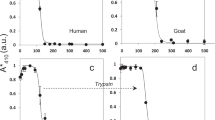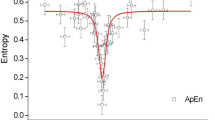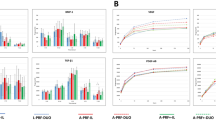Abstract
SAMPLES of the whole blood of two amphibians (Bufo marinus and Hyla caerulea) which we have examined, after clotting in vitro, either naturally or by recalcification or on the addition of bovine thrombin, regularly become liquid again within a few hours. Investigation of this phenomenon, with human fibrinolysis in mind as a model, has revealed some interesting contrasts.
This is a preview of subscription content, access via your institution
Access options
Subscribe to this journal
Receive 51 print issues and online access
$199.00 per year
only $3.90 per issue
Buy this article
- Purchase on Springer Link
- Instant access to full article PDF
Prices may be subject to local taxes which are calculated during checkout
Similar content being viewed by others
References
Hackett, E., and Le Page, R., Austral. J. Exp. Biol. and Med. Science, 39, 57 (1961).
Hackett, E., and Le Page, R., Austral. J. Exp. Biol. and Med. Science, 39, 67 (1961).
Bettelheim, F. R., and Bailey, K., Biochim. Biophys. Acta, 9, 578 (1952).
Kaplan, E. H., Proc. Soc. Exp. Biol. and Med., 85, 142 (1954).
Author information
Authors and Affiliations
Rights and permissions
About this article
Cite this article
HACKETT, E., HANN, C. Erythrocytes and the Liquefying of Clotted Amphibian Blood in vitro. Nature 204, 590–591 (1964). https://doi.org/10.1038/204590a0
Issue Date:
DOI: https://doi.org/10.1038/204590a0
This article is cited by
-
Comparative vertebrate fibrinolysis
Comparative Clinical Pathology (2010)
-
A Spontaneously Active Fibrinolytic System in Xenopus laevis which is further activated by Human Urokinase
Nature (1965)
Comments
By submitting a comment you agree to abide by our Terms and Community Guidelines. If you find something abusive or that does not comply with our terms or guidelines please flag it as inappropriate.



